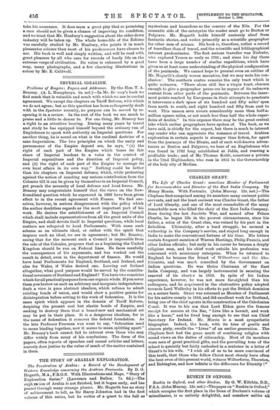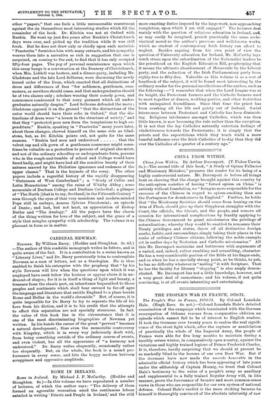RUSKIN IN OXFORD. other "papers," that one feels a little
unreasonable resentment against the (in themselves) most interesting studies which fill the remainder of the book. Dr. Kitchin was not at Oxford with Ruskin. He went up just five years after Ruskin's Christchurch days were over, and picked up the tradition while it was still fresh. But he does not draw only or chiefly upon such material. " Praeterita " furnishes him with many extracts, and his sympathy weaves them into a narrative so rich in suggestion that one is surprised, on coming to the end, to find that it has only occupied fifty-four pages. The peg of personal reminiscence upon which this essay hangs is a conversation at the Deanery of Christchurch, when Mrs. Liddell was hostess, and a dinner-party, including Mr. Gladstone and the late Lord Selborne, were discussing the newly issued order of the Dean, which enacted that all distinctions of dress and differences of fees "for noblemen, gentlemen, com- moners, or servitors should cease, and that undergraduates should be of two classes only ; scholars wearing their comely gown, and commoners condemned to that sorry garment which all under- graduates naturally despise." Lord Selborne defended the move ; Gladstone opposed it on the ground "that the distinctions of the outer world should have their echo in Oxford," that the dis- tinctions of dress were "a lesson in the structure of society," and that they "protected poor men from the temptations to high ex- penditure." Ruskin, speaking in "Praeterita" many years later, about these changes, showed himself on the same side as Glad- stone, but, as Dr. Kitchin points out, not quite for the same
reasons. "Ruskin had seen and understood that the velvet cap and silk gown of a gentleman commoner might some- times be valuable as a protection to persons of original chal actor, and not of the ordinary schoolboy or undergraduate form, persons who in the rough-and-tumble of school and College would have faxed badly, and might have had all the sensitive beauty of their natures marred by the Philistine ignorance and rudeness of the upper classes." That is the keynote of the essay. The other papers include a regretful history of the rapidly disappearing "Statesmen of West Cumberland" ; a "Study of Celtic and Latin Monasticism" among the ruins of 1Vhitby Abbey ; some memorials of Durham College and Durham Cathedral ; a glimpse of "The North [that is to say, Scotland] in the Fifteenth Century" seen through the eyes of that very mundane and modern-minded Pope still in embryo, Aeneas Sylvius Piccolomini ; an episode of Dante ; and last, but not least, an appreciation of Bishop Butler and "The Analogy." All the papers have the charm of the thing written for love of the subject, and the grace of a style that mingles sympathy with scholarship. The volume is as pleasant in form as in matter.























































 Previous page
Previous page